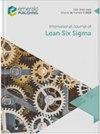An exploratory study of the relationships between Lean practices and team performance in higher education
IF 3.7
2区 工程技术
Q2 ENGINEERING, INDUSTRIAL
引用次数: 0
Abstract
Purpose The purpose of this paper is to evaluate the causal relationship between Lean practices and team performance. Specifically, the authors tried to demonstrate which practices act as enablers of continuous improvement and waste elimination and what is their impact on team performance. Design/methodology/approach A survey was carried out in a Higher Education Institution (HEI) in Southern Brazil. The authors obtained a sample of 785 respondents. The data analysis procedures involved confirmatory factor analysis and structural equations modeling. Findings The results of the research provided support for the positive influence of continuous improvement on waste elimination and of these two practices on team performance. In addition, empirical support was obtained for the effect of leadership support, employee involvement and internal process customers on continuous improvement. Research limitations/implications Data collection was carried out online, so we were not able to maintain full control of the research respondents. This research generates relevant insights for decision-makers in the HEI environment, especially concerning Lean practices and team performance. The effects analyzed are even more relevant given the pandemic context. Practical implications This study shows how some higher education Lean practices can positively affect continuous improvement and better team performance. The results raise important insights for decision-makers to offer better higher education public services, especially given the context and changes imposed by the pandemic situation. Originality/value This paper initiates the discussion about enablers of continuous improvement and waste elimination in HEI and demonstrates their impact on team performance.高等教育中精益实践与团队绩效关系的探索性研究
目的本文的目的是评估精益实践与团队绩效之间的因果关系。具体而言,作者试图证明哪些实践是持续改进和消除浪费的推动者,以及它们对团队绩效的影响。设计/方法/方法在巴西南部的一所高等教育机构(HEI)进行了一项调查。作者获得了785名受访者的样本。数据分析程序包括验证性因素分析和结构方程建模。研究结果为持续改进对废物消除的积极影响以及这两种做法对团队绩效的积极影响提供了支持。此外,领导支持、员工参与和内部流程客户对持续改进的影响也得到了实证支持。研究局限性/含义数据收集是在网上进行的,因此我们无法完全控制研究对象。这项研究为HEI环境中的决策者提供了相关的见解,尤其是关于精益实践和团队绩效的见解。考虑到疫情背景,所分析的影响更具相关性。实践意义本研究表明,一些受过高等教育的精益实践可以积极影响持续改进和更好的团队绩效。研究结果为决策者提供更好的高等教育公共服务提供了重要见解,特别是考虑到疫情带来的背景和变化。独创性/价值本文讨论了HEI中持续改进和消除浪费的推动者,并展示了它们对团队绩效的影响。
本文章由计算机程序翻译,如有差异,请以英文原文为准。
求助全文
约1分钟内获得全文
求助全文
来源期刊

International Journal of Lean Six Sigma
Engineering-Industrial and Manufacturing Engineering
CiteScore
8.90
自引率
15.00%
发文量
46
期刊介绍:
Launched in 2010, International Journal of Lean Six Sigma publishes original, empirical and review papers, case studies and theoretical frameworks or models related to Lean and Six Sigma methodologies. High quality submissions are sought from academics, researchers, practitioners and leading management consultants from around the world. Research, case studies and examples can be cited from manufacturing, service and public sectors. This includes manufacturing, health, financial services, local government, education, professional services, IT Services, transport, etc.
 求助内容:
求助内容: 应助结果提醒方式:
应助结果提醒方式:


